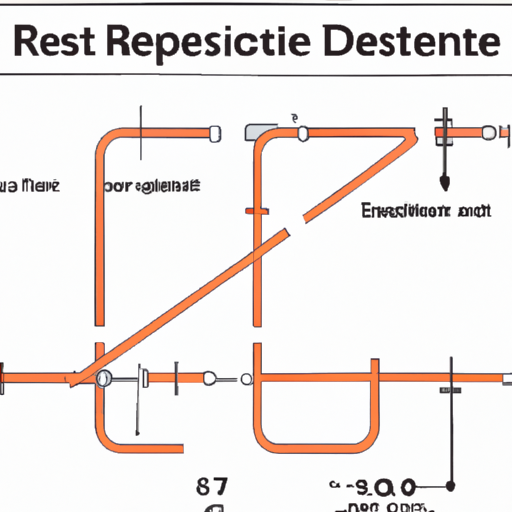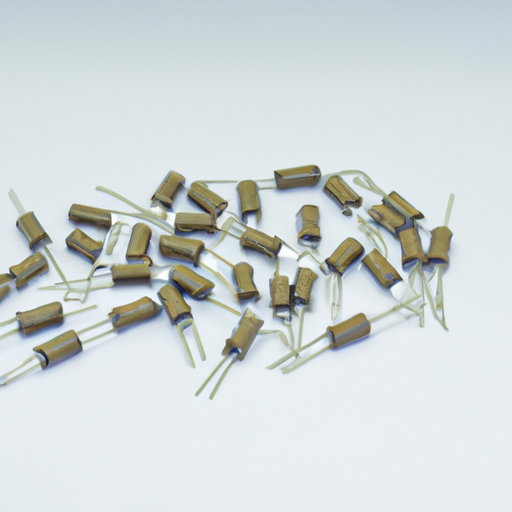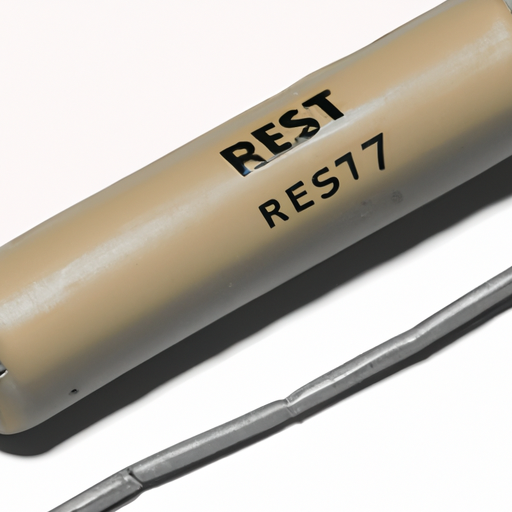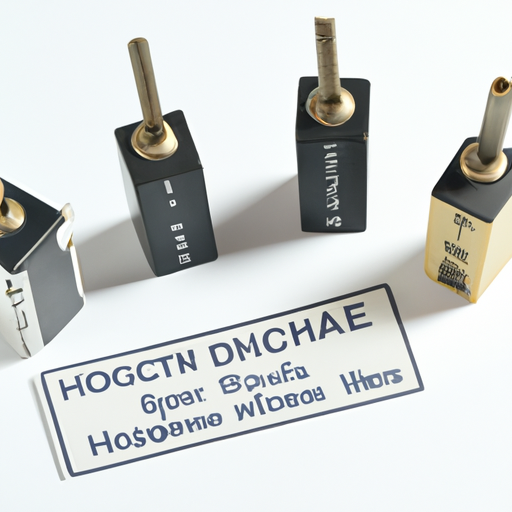What are the Product Features of Frequency Sensitive Resistors?
I. Introduction
In the realm of electronics, resistors play a fundamental role in controlling current flow and voltage levels. Among the various types of resistors, frequency sensitive resistors stand out due to their unique ability to respond to changes in frequency. These components are essential in a wide range of applications, from audio equipment to communication systems. This article delves into the product features of frequency sensitive resistors, exploring their principles, key characteristics, applications, advantages, challenges, and future trends.
II. Basic Principles of Frequency Sensitive Resistors
A. Understanding Resistance and Frequency
At the core of frequency sensitive resistors is the relationship between resistance and frequency. According to Ohm's Law, the current flowing through a conductor between two points is directly proportional to the voltage across the two points and inversely proportional to the resistance. However, in frequency sensitive resistors, this relationship becomes more complex due to the frequency response of the material.
1. Ohm's Law
Ohm's Law is a fundamental principle that defines the relationship between voltage (V), current (I), and resistance (R) in an electrical circuit. It is expressed as:
\[ V = I \times R \]
In frequency sensitive resistors, the resistance can vary with frequency, leading to different behaviors in AC (alternating current) circuits compared to DC (direct current) circuits.
2. Frequency Response
Frequency response refers to the way a component reacts to different frequencies of an input signal. Frequency sensitive resistors exhibit varying impedance at different frequencies, which can significantly affect circuit performance.
B. Types of Frequency Sensitive Resistors
Frequency sensitive resistors come in various forms, each with distinct characteristics and applications:
1. Variable Resistors
Variable resistors, such as potentiometers, allow users to adjust resistance manually. They are commonly used in applications requiring adjustable voltage levels, such as volume controls in audio equipment.
2. Thermistors
Thermistors are temperature-sensitive resistors that change resistance with temperature variations. They are widely used in temperature sensing and control applications.
3. Photoresistors
Photoresistors, or light-dependent resistors (LDRs), change resistance based on light intensity. They are commonly used in light-sensing applications, such as automatic lighting systems.
4. Varistors
Varistors are voltage-dependent resistors that exhibit non-linear resistance behavior. They are primarily used for surge protection in electronic circuits.
III. Key Features of Frequency Sensitive Resistors
A. Frequency Response Characteristics
1. Impedance Variation with Frequency
One of the most significant features of frequency sensitive resistors is their impedance variation with frequency. As the frequency of the input signal changes, the impedance of these resistors can increase or decrease, affecting the overall circuit behavior.
2. Phase Shift
Frequency sensitive resistors can also introduce phase shifts in the signal. This phase shift can be critical in applications such as audio processing, where timing and synchronization are essential.
B. Temperature Coefficient
1. Impact of Temperature on Resistance
The temperature coefficient of resistance (TCR) indicates how much a resistor's resistance changes with temperature. Frequency sensitive resistors, particularly thermistors, have a significant TCR, making them suitable for temperature sensing applications.
2. Applications in Temperature Sensing
Thermistors are widely used in applications such as HVAC systems, automotive temperature monitoring, and medical devices, where precise temperature measurements are crucial.
C. Non-Linear Resistance Behavior
1. Explanation of Non-Linearity
Many frequency sensitive resistors exhibit non-linear resistance behavior, meaning their resistance does not change linearly with voltage or current. This non-linearity can be advantageous in specific applications, such as signal processing, where it can enhance the performance of circuits.
2. Applications in Signal Processing
Non-linear resistors are often used in audio and communication systems to manipulate signals, allowing for improved sound quality and signal integrity.
D. Power Rating and Thermal Stability
1. Maximum Power Handling
Frequency sensitive resistors have specific power ratings that indicate the maximum power they can handle without failure. Understanding these ratings is crucial for ensuring reliable circuit operation.
2. Thermal Management Considerations
Thermal stability is another critical feature of frequency sensitive resistors. Effective thermal management is necessary to prevent overheating, which can lead to changes in resistance and potential circuit failure.
IV. Applications of Frequency Sensitive Resistors
A. Audio Equipment
1. Equalization and Filtering
In audio equipment, frequency sensitive resistors are used for equalization and filtering. By adjusting resistance based on frequency, these components help shape the audio signal, enhancing sound quality.
2. Signal Processing
Frequency sensitive resistors play a vital role in signal processing, allowing for the manipulation of audio signals to achieve desired effects.
B. Communication Systems
1. Impedance Matching
In communication systems, impedance matching is crucial for maximizing power transfer and minimizing signal reflection. Frequency sensitive resistors help achieve optimal impedance levels across various frequencies.
2. Signal Integrity
Maintaining signal integrity is essential in communication systems. Frequency sensitive resistors contribute to this by ensuring consistent performance across a range of frequencies.
C. Automotive Electronics
1. Sensor Applications
In automotive electronics, frequency sensitive resistors are used in various sensors, including temperature and light sensors, to monitor and control vehicle systems.
2. Control Systems
Frequency sensitive resistors are also employed in control systems, where they help regulate various functions, such as engine performance and climate control.
D. Industrial Automation
1. Process Control
In industrial automation, frequency sensitive resistors are used in process control systems to monitor and adjust parameters, ensuring optimal performance.
2. Monitoring Systems
These resistors are also utilized in monitoring systems, where they help track various environmental and operational conditions.
V. Advantages of Frequency Sensitive Resistors
A. Enhanced Signal Quality
Frequency sensitive resistors contribute to enhanced signal quality by allowing for precise control over resistance and impedance, leading to clearer and more accurate signals.
B. Improved Circuit Performance
By optimizing resistance based on frequency, these resistors improve overall circuit performance, making them essential in high-fidelity audio and communication systems.
C. Versatility in Applications
The versatility of frequency sensitive resistors allows them to be used in a wide range of applications, from consumer electronics to industrial automation.
D. Cost-Effectiveness
Despite their advanced features, frequency sensitive resistors can be cost-effective solutions for many electronic applications, providing significant value for their performance.
VI. Challenges and Limitations
A. Frequency Range Limitations
One of the challenges of frequency sensitive resistors is their frequency range limitations. Not all resistors can operate effectively across a wide range of frequencies, which can restrict their applications.
B. Sensitivity to Environmental Factors
Frequency sensitive resistors can be sensitive to environmental factors such as temperature and humidity, which can affect their performance and reliability.
C. Complexity in Design and Implementation
Designing circuits that effectively utilize frequency sensitive resistors can be complex, requiring careful consideration of their characteristics and behavior.
VII. Future Trends in Frequency Sensitive Resistors
A. Advances in Material Science
Ongoing advances in material science are expected to lead to the development of new frequency sensitive resistors with improved performance characteristics, such as wider frequency ranges and enhanced thermal stability.
B. Integration with Smart Technologies
As smart technologies continue to evolve, frequency sensitive resistors are likely to be integrated into more devices, enabling advanced features such as real-time monitoring and control.
C. Miniaturization and Enhanced Performance
The trend toward miniaturization in electronics will likely drive the development of smaller, more efficient frequency sensitive resistors, allowing for greater design flexibility and improved performance.
VIII. Conclusion
In summary, frequency sensitive resistors are essential components in modern electronics, offering unique features that enhance circuit performance across various applications. Their ability to respond to changes in frequency, along with their non-linear resistance behavior and temperature sensitivity, makes them invaluable in fields such as audio, communication, automotive, and industrial automation. As technology continues to advance, the future of frequency sensitive resistors looks promising, with potential developments in material science, smart technology integration, and miniaturization. Understanding the product features of these resistors is crucial for engineers and designers seeking to optimize their electronic circuits and systems.












